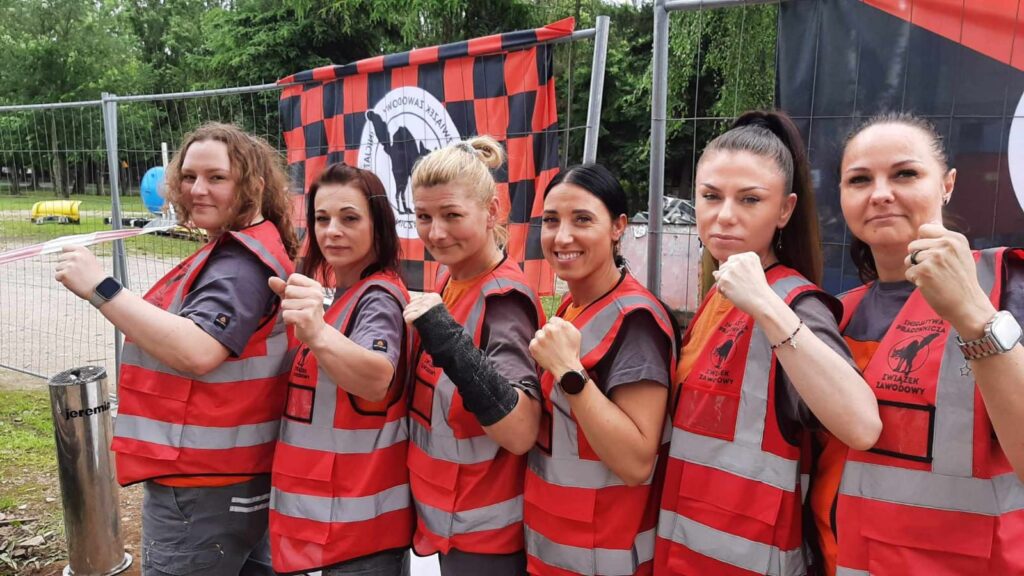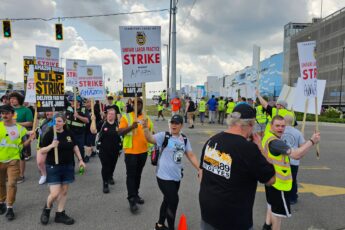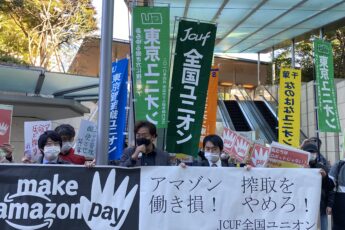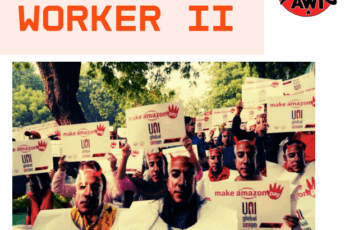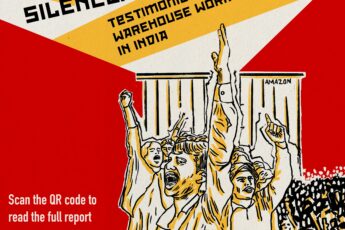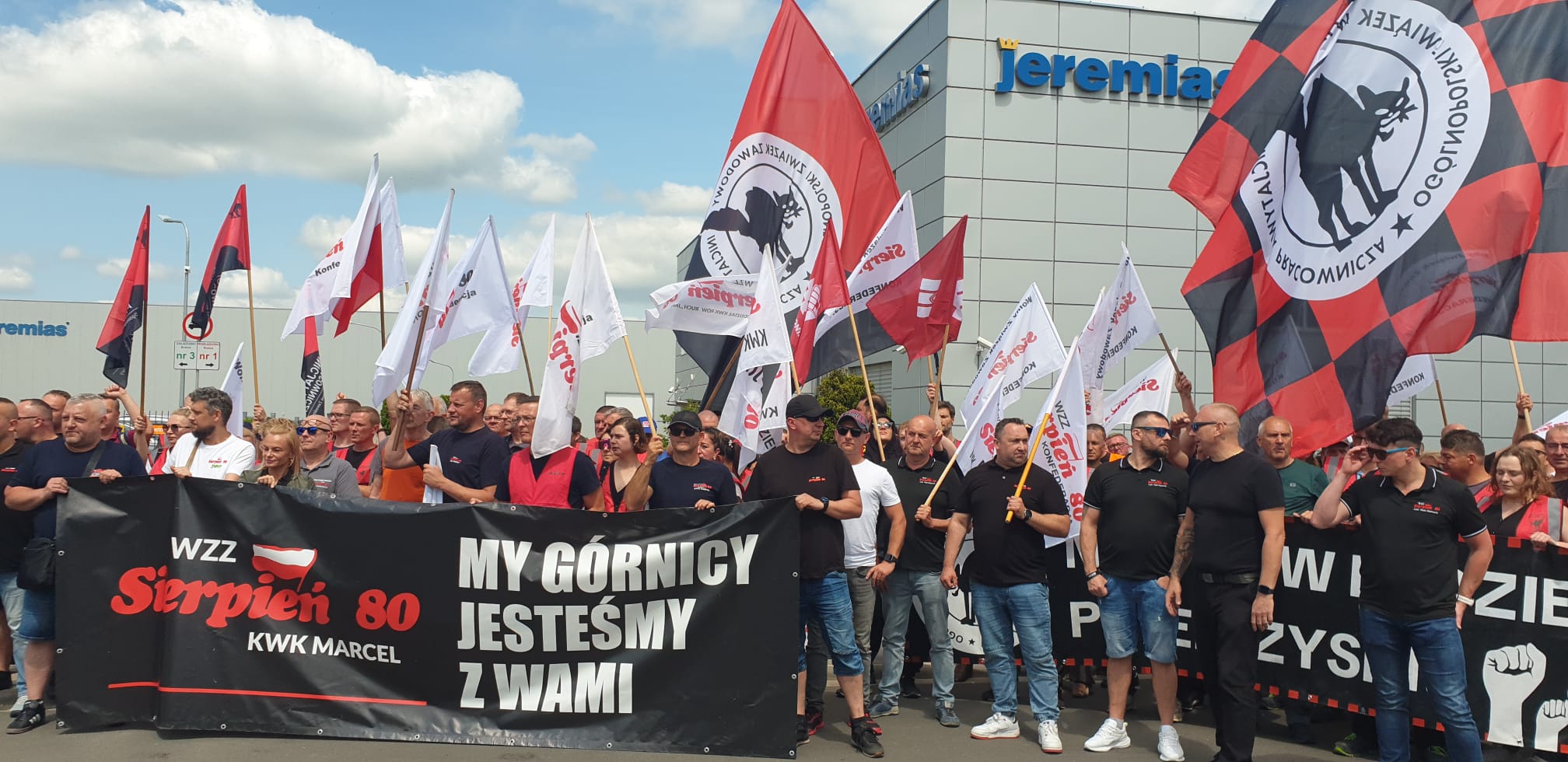
Interview with Workers’ Initiative on the strike at Jeremias factory in Gniezno
We are publishing this interview Laura Montanari (TSS) made with Bartek Kurzyca from the Inicjatywa Pracownicza (Workers’ Initiative) labor union in Poland. On June 3rd, IP, together with workers at the Jeremias chimney factory in Gniezno, initiated a strike that has now been ongoing for several weeks, making it the second-longest strike in Polish history since 1980.
As the strike enters its sixth week, the company’s management has hired 30 temporary workers to replace the striking employees. However, the company has yet to respond to the union’s offer for a compromise, which was presented on June 13th. City mayor and the councilors offered to mediate with Jeremias’ management, with respect for the union’s legal rights in the collective dispute. In response to hiring the scabs and other actions by management that undermined the agreement and the legal strike, on July 3rd, the strikers occupied all pedestrian crossings around the Jeremias factory for eight hours. Supporters of the strike have also been blocking the trucks from entering the factory in recent days.
This strike is a great example of organisation and addresses not only the working conditions of the Polish workers hired by a German company, which, like many others, moved the production to Eastern Europe, but also the very material effects of war on migrant workers and social production. Ukrainian workers in fact have become a synonym for temporary workers, as the bosses use their precarious position to exploit them even more and impose on them the hard choice between being exploited or going back to their war-torn country, as some actually did. Since the start of the war in Ukraine due to a lack of labour force, the number of workers coming from South America and East Asia has risen decisively, we will delve more in depth on this topic in an interview we did with Colombian workers living in Poland, members of the Sindicato de trabajadores latinoamericanos en Polonia, also part of Inicjatywa Pracownicza. After the presidential elections, nothing will change much for the workers, as the soon-to-be president is from the same party as the previous one. As it happens in different European countries, in Poland the far right surged and still detains power, while the liberal parties blame the lack of success on poor and workers, and the left struggles to connect with the material conditions and requests of the working class, even if in the Jeremias case their support was at some point crucial. The interview shows clearly the necessity of organising a transnational struggle against exploitation and war.
Bartek Kurzyca: Inicjatywa Pracownicza’s national committee, delegate to support the dispute and strike at Jeremias factory.
To keep updated, follow https://www.facebook.com/OZZIPJEREMIAS
Support the Jeremias workers on strike for more than one month!
Here is the link to the fundraiser organized by OZZ Inicjatywa Pracownicza: https://zrzutka.pl/en/m2xrgk
Why the fundraiser? According to our Law, in Poland, workers do not receive wages for the days of strike (unless the management agrees to provide them during final negotiations). Low paychecks do not allow them to support themselves and their families during the strike. IP union is still small, and its funds are based on contributions paid by workers who very often also earn the minimum wage.
Therefore, if you have the opportunity, we ask you to enable the workers to continue the struggle by contributing any amount to the fundraiser!
TSS: What kind of company is Jeremias? How does it operate?
BARTEK: Jeremias manufactures steel chimney systems for other industries and individual purposes. The factory in Gniezno, Poland, is a subsidiary of an international corporation based in Germany, Jeremias Abgastechnik GmbH. The headquarters are located near Nuremberg, and they operate all over the world. Production sites are spread in the Czech Republic, Britain, the United States, Spain, and Germany. They distribute the chimney systems to Asia, Japan, Latin America, all over the world, basically, into every continent.
Polish workers comprise nearly one-third of all the Jeremias workers in the world, not counting the production workers hired in prisons.
TSS: So, a German Company moving its production sites to Eastern Europe. It is not that uncommon, right? Can you give us more information?
BARTEK: Yes, Jeremias moved part of his production to Poland due to the clear advantages of labor division. Labor here is way cheaper. Roughly based on statistics, the cost of labor in Poland is three times lower than in Germany. So, one worker hired in Poland provides the company as much profit as three workers in Germany. The profits have risen by 400% in the last 10 years. Right now, it’s around 17 million euros in net profit. And the Polish factory is responsible for half of it, or 60%, meaning around 9 million euros. The company bases its operation model on avoiding taxes in Poland. The components (the parts that are the most time- and energy-consuming, difficult to make, and the least profitable) produced here in Gniezno are essential for assembling the complete chimney at the German factory, and with the components, also the profits go to Germany.
TSS: How long has the strike been going on?
BARTEK: We just finished the 3rd week (interview took place on 21.06.2025). This is the longest strike our union has experienced so far, and we must keep in mind that Poland has some of the strictest anti-strike laws in Europe.
(As of July 7th, the 6th week of the strike is starting, making the Jeremias strike the longest one in Poland since 1980).
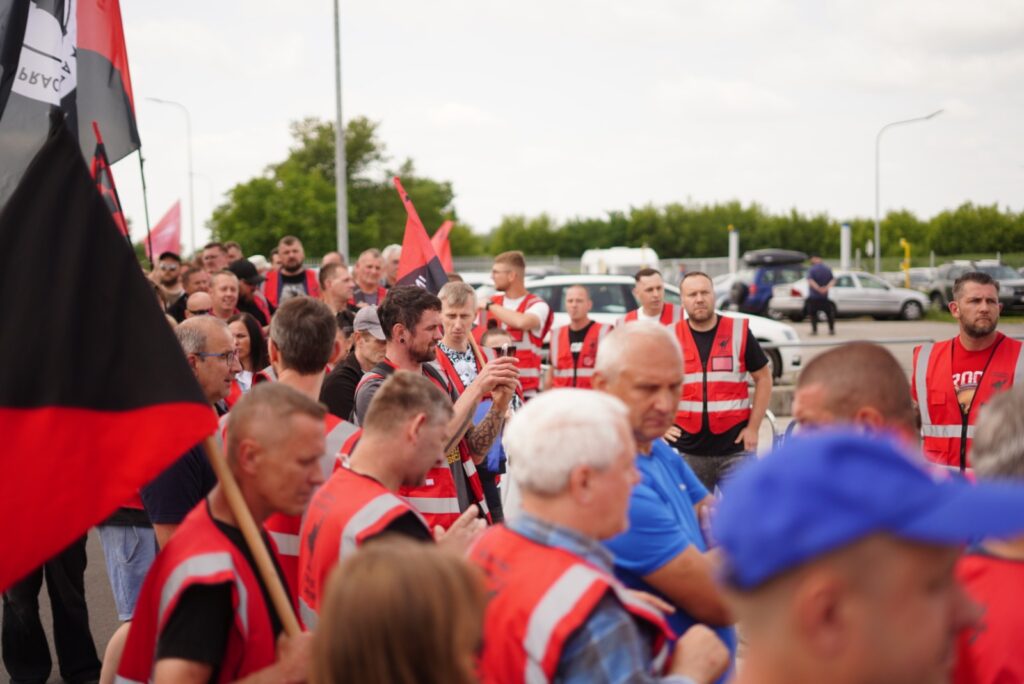
TSS: The strike needs to be declared as legal before you can start, right?
BARTEK: Yes, before initiating a strike, you must go through a series of negotiations, part of which involves direct discussions between the union and the employer. The second round of negotiations is between the union and the boss, with the assistance of the mediator provided by the Minister of Labor. If no agreement is reached, then you can proceed to a referendum. The strike vote needs to have a quota of 50% which is very hard to get among all the workers, especially in the case of workplaces spread through in a dozen different locations, like Amazon warehouses, or Auchan market chain. In Poland, since the system transition to parliamentary democracy, nearly half of the parliamentary elections have not reached the quota of 50%. If the elites imposed the same limits on themselves that they impose on workplace democracy, half of the parliamentarians would be governing illegally.
Jeremias in Gniezno hires around 380 workers. Roughly 140 out of 230 production workers are members of our union. The rest are office workers, most are not unionized. Our union passed through all the formal phases of dispute with the bosses. We won the referendum. The turnout in the referendum was higher than the turnout in the Polish presidential election in the first round, which happened on the same day. More than 70% of the voting workers voted for the strike.
TSS: Why did you think you had such success?
BARTEK: There are structural reasons. One is that the factory comprises qualified workers who know the production process better than the leaders and the managers. These workers have been doing their job for 15-20 years. It’s not like a mass worker at Amazon, where the rotation is huge. The other one is that there is one workplace, and the workers are not spread all over the country. They know each other well, many come from the same region.
TSS: Are all these workers employed directly by Jeremias, or are there some subcontractors?
BARTEK: Around 380 are employed directly. All office workers are. Some of them don’t even work, but they are paid because they are family members of the bosses or whatever. But formally, they are part of the office. And then there are, apart from this 380, around 60 prisoners in Gniezno factory, who are formally not considered workers. So they don’t have workers’ rights and cannot join any union in Poland. Jeremias has built two factories inside the prison nearby, where it employs another 120 forced workers.
TSS: It’s really similar to how it is in the US, for example. Where the prisoners have to work and they are not considered workers, and there’s nothing else that they can do.
BARTEK: Definitely. They are the most precarious. Somehow corresponding to the condition of refugees or migrant workers. If they resist, they’re immediately sent to a different prison far away, losing the bonds with the family that brings food, clothes, and stuff.
So it’s very hard to resist there. The prison chief warned them that if they resisted or showed solidarity with the strikers, they would be immediately transferred to a remote prison in the mountains.
TSS: Do they get paid? And how does it work for companies employing prisoners?
BARTEK: Since the reform of the prison labor system around 2016 in Poland, they’ve been allowed to work for private companies. Private Factories can be set inside the prisons, and built through the so-called Prison Workplace Development Fund. The fund is created from the money taken from the prisoners’ salaries. 51% of each prisoner’s salary is deducted to fund the construction of these private factories within the prisons.
Then, 7% of the salary is deducted for post-penitentiary support, ensuring that prisoners have some sort of future after their release. Around 5% is taken to cover fines or other obligations. The remaining 40%, approximately, belongs to the prisoner. And the State even pays the private companies to hire the prisoners.
TSS: So, for the companies, it’s a double win.
BARTEK: Totally, yeah. And the State itself is sponsoring social dumping.
TSS: What are the demands of the workers for this strike?
BARTEK: Basically, workers fight for higher wages, longer breaks, shorter working week, and a lower pace of work. We have four demands: raising the monthly salary by circa 180 Euro, 800 zlotys per month; Doubling the time of the daily break, from 15 to 30 minutes; As important as the salary, limiting the period to pay for the overtime from twelve months to one month. In Poland, since the world economic crisis in 2008, they introduced this supposedly temporary measure of lengthening the period of counting overtime hours from one month to 12 months. I don’t know if there is anything like this in the West. You can never see this money because you work for six days for half of the year, and then you work less, for example, just before Christmas or when the production season is low; We also want a lower pace of work through the reinstatement of fair bonus rules.
TSS: Was there something else that triggered so much the workers’ willingness to strike?
BARTEK: The strategy of the employer from almost the beginning was to paralyze the possibility of reaching an agreement. Many international companies moving production to Poland are using all very hardcore methods to break the unions. The boss hired an American law firm, Littler, specialized in union busting. Littler has been focusing on our union in recent years. This law firm contacts the companies where workers publicly announce that they are organising with our union, and offers its services. They are also present in Polish Volkswagen, Amazon, and smaller workplaces as well, like Danfoss, NielsenQ, Janpol, etc. So in Jeremias, the litigator convinced the bosses to try to sabotage the procedure of the collective dispute with the union, stating that our demands are illegal. They wanted to paralyze the formal procedure, which ends up in a legal strike if no agreement is reached. During one of the first negotiations, they showed us an NDA document, pressuring us to sign it. If we had signed, it would have forbidden us from discussing working conditions with other employees, distributing leaflets, using the union board inside the factory to post our flyers, and more. The very basics of the union would have been illegal, and for every breach of this, for every contact with the worker about the working conditions, the union members would have needed to pay a 25,000 zlotys fine. Which is around 8,000 euros.
So our union lawyer tore the document up on the table, in front of the bosses. We all went outside, and they said, “Oh, no, everything’s illegal, you will be fired, blah blah blah”. But instead of getting quiet, we started to be as loud as possible. So in October, we organized a big, national protest at the factory gates, attended by most of Jeremias’ production workers, other union members, and sympathisers in the country. Through this mobilization, we tried to show them that the more they press us to be quiet, the louder we are. During the dispute, the most charismatic person, who was also part of the dispute from our side, Mariusz Piotrowski, was fired illegally. He is both a union member and the main social inspector of work.
TSS: And is it possible to fire the social inspector? What was the reason for that?
BARTEK: Mariusz initially used his role as a social inspector to halt work in the paint department (where highly flammable paints are used) for several hours. The union confirmed that the factory was at risk of an explosion due to sparks and electrostatic discharge caused by the work overload. Mariusz also imposed oversight from the state inspector. The management, however, tried to sabotage this by hindering the communication between Mariusz, the social inspector, and the state inspector. On one of the first days of the inspection, they prevented Mariusz from entering the factory. They handed him a document confirming his employment, but stating he couldn’t enter the workplace, while still agreeing to pay him. Then, after three or four days, they issued a disciplinary dismissal, claiming he posed a danger to the factory. Just before the strike began, the company lost a court case, which ruled that Mariusz should be reinstated immediately. However, Littler and the management ignored the court order and refused to let him return to work.
This is like a country within a country. They govern the factory by their own rules, and they are boycotting every inspection, every court, even the minister, because we managed to engage the minister of labor there as well.
TSS: What happened after the minister of labor came to visit Jeremias?
BARTEK: Without Mariusz inside, we were still negotiating our demands with the boss. We knew that the boss was threatening other workers because, through Mariusz’s case, they sent them the message that if he was double secured against the firing, everyone could be fired. The boss kept saying that the members of the union are criminals. So to break the growing fear among the workers, we needed to find an institution that would legitimize our dispute and potentially the future strike, reassuring the workers that what we were doing wasn’t illegal and that we were not criminals. The Minister visited the workers just before the referendum. She gave a speech stating that, according to the ministry’s lawyers, the dispute was entirely legal, that the workers had the right to vote either for or against the strike, and that they could legally go on strike if they chose to. This happened on April 28th.
This Minister actually comes from the “new wave of the left”, because what is called left in Poland is traditionally a post-communist neoliberal tendency that accepted all the hardcore neoliberal reforms after the transition to capitalism. She belongs to the Left party but comes from a new generation of leftist politicians. For that time, it was crucial, and also an important message for the workers before the strike vote.
We organized the vote, and we won it. Of course, the boss called it illegal as well. But the union ignored his threats and issued an ultimatum to the management board: last-chance talks before the strike. Littler tried again to weaken us by introducing a parallel ‘workers’ representation’ to join negotiations. This is one of the tools used by Littler all over Poland. They call it the Workers Forum. It is not a yellow union but another kind of body controlled by the boss. During this ultimatum meeting, they brought eight office workers, saying that they were “the Workers Forum” from that day, and they are part of the negotiating team because we couldn’t represent everybody. But we managed to push them out of the room. We stuck to the formal procedure of the collective dispute, where there can be only two sides during the negotiations. One side is the union as a formal representative of the workers who started the collective dispute. The other side is the employer. There’s no place for any fake bodies in our talks.
Littler in Poland tries to do whatever it can to breach the last laws that are still there to defend workers in the country. They’re undermining the basics of the workers’ rights system.
They are undermining the basics if you look at the papers; however, the capitalist system is not only based on the papers, but on the dynamics in the relations of production.
Anyway, they gave a compromise offer, which was almost nothing. We made a vote among the union members, whether the union should accept the compromise offer or organize a strike. And around 90% of the votes were for the strike. This happened in the last days of May. The strike broke out on the 3rd of June.
From the first day, Littler and the bosses managed to move the strike initiators to a separate part of the factory and to isolate them, like in prison. In one of the most paradoxical episodes, they used the prisoners to build a kind of cage on the other side of it. They put private guards at every door so that none of the strikers could move out or go to the toilet if someone else was inside. They also enforced different schedules for the start and end of the shift so that the strike initiators couldn’t see the ones that didn’t catch up for the strike, and couldn’t speak with them, to prevent the strike from escalating. Still, every day, two or three people were joining the strike.
Since the first week, the strikers tried to break the isolation, and somehow, the bosses helped promote the strike all over the country, because the tools they used to break it were quite spectacular.
Another astonishing moment was when they closed all the emergency doors to the strikers, posing a great risk to them. It’s a chimney system factory with a lot of welding, painting, and various highly toxic chemicals. Part of the factory is formally a so-called Zone 20, meaning that it’s under a constant risk of explosion. Zone 20, the paint department (with highly flammable and toxic paints), was actually where the first sparks of the strike appeared, and where the strike exploded with the biggest force. Fighting against pollution and health issues was always an important part of the workers’ struggle in Jeremias.
TSS: You managed to break the censorship that the company wanted to impose by taking to the streets of the city, going outside of the factory, and protesting. There you gathered a lot of people.
BARTEK: After workers got isolated and under rising pressure from the boss, the union changed its strategy. None of the strikers entered the factory. Instead, we took the strike to the city, to make it as loud as possible, to do all the protests outside with both shifts together, all the strikers. At Jeremias gates, we hosted groups from other factories that have won their strikes in recent years, like Solaris bus factory from the same region (Konfederacja Pracy union), also the miners from Silesia region south of Poland, (Sierpień 80 union), that are traditionally considered the most militant part of the workers movement here in Poland, oriented towards direct action. We also successfully pressed for organizing a so-called special session of the local city parliament. Through all these sorts of actions, we regained the initiative of the strike, and the company has been pushed to the defence. Through the gates, every day, the strikers communicate with the ones that didn’t join yet. Some of the scabs used to say they would join the strike “tomorrow”. That’s why the strikers often chant at the gates: “Tomorrow is Today!”
We had to constantly experiment with what kind of pressure a big group can build outside the factory gates. And tomorrow (22nd June) we are going to protest at the German embassy, trying to get the German bosses’ and media’s attention. They are the ones who keep the money, pay for all these tools to smash our union and the strike, instead of sharing more funds with the workers in Poland.
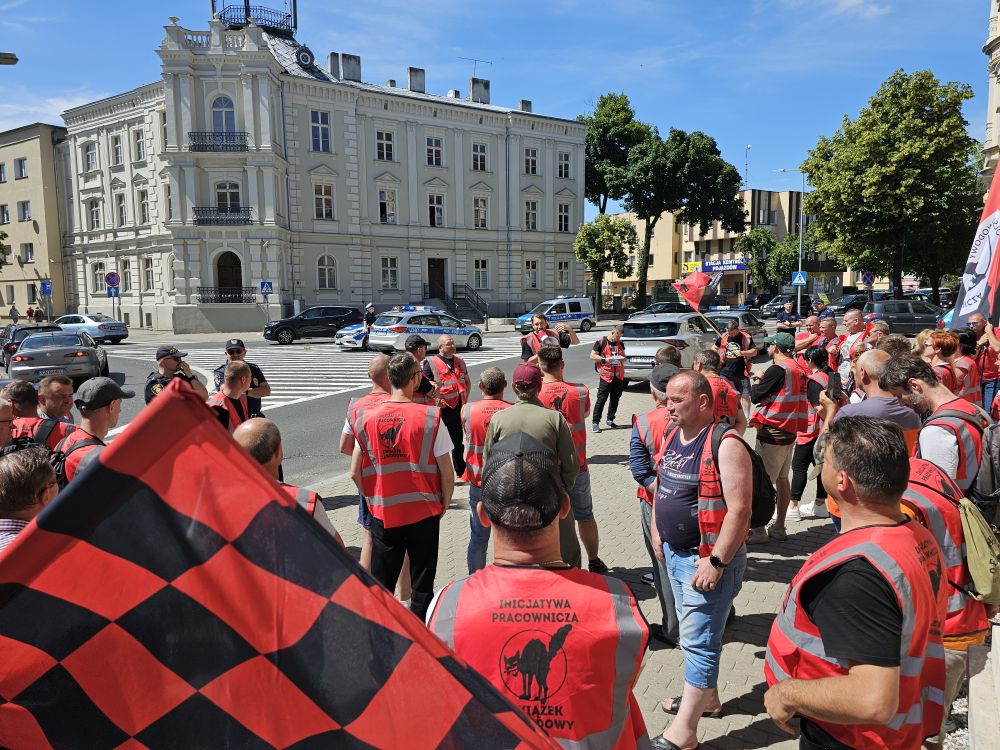
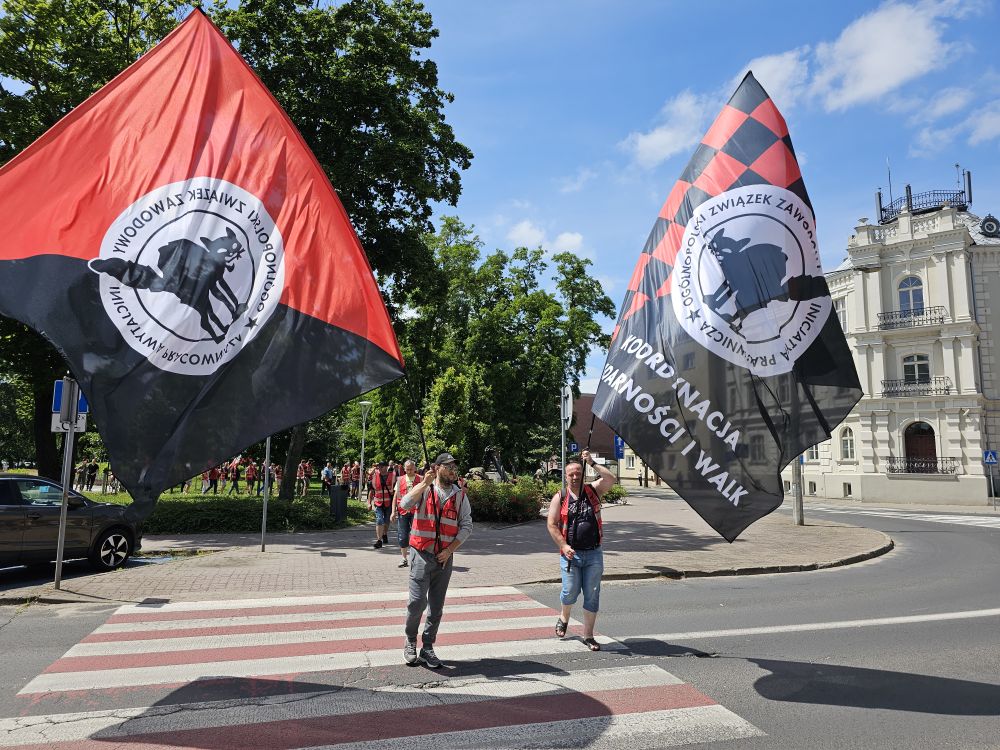
TSS: Did you manage to connect with some German groups?
BARTEK: The second week, we connected with FAU comrades, who organized leafleting at the Jeremias factory near Nuremberg, supported the strike fund, and tried to get media attention. FAU comrades are worth mentioning and praising for their engagement and support, as the only group in Germany that got engaged in this strike [“Fridays for Future” collective contacted the strikers and the German Jeremias managers in the fifth week of the strike – update]. Our perspective is that in Germany, the left is very big, but it’s one of the weakest in Europe when it comes to questioning the relations of production and division of labor between Germany and the closest East (Poland, Czech, Ukraine, etc), from where the workers produce much of wealth for public and private sectors in Germany through transfers of profits and taxes from Poland. The left there is very much into the geopolitical stuff, but the topic of strikes and repressions against workers by German companies is hardly present there. It is not that connected to workplace reality, I think. It is also partly due to structural constraints, specifically the German legal system, that prevents militant unions from entering the workplaces. Still, apart from links with FAU, for example, workers from our union at Amazon form a strong network with militant workers and supporters in German warehouses through Amazon Workers International. None of the German MPs commented on the strike, though Jeremias was discussed in the Polish Parliament by the Minister of Labor and other MPs. This low interest or the presence of this strike within German media has been noticed and commented on by the Jeremias workers.
TSS: You were saying before about the role of the leftist parties in Poland. What did they do in practice, apart from saying that the strike was legal?
BARTEK: It was crucial to have the mentioned expertise from the Ministry of Labor, stating that the bosses wrongfully accused the union of organizing an illegal strike. We never had any attention from the Ministry of Labor. I think no workers have had it for 33 years since the transition to capitalism. So people felt it was kind of transgressive from their side.
Already at the beginning of this tough dispute in autumn 2024, the Minister invited us to her headquarters. In spring, she went to the factory also to speak with the factory workers about their rights, stating that they got the same stomachs as German workers and deserve the same rights. This never happened. But then, after two weeks, people felt that the parliamentarians could do more. Workers asked them to utilize this instrument of so-called parliamentary intervention, allowing them to enter even a private factory to control a problem. A delegation of the Left parliamentarians tried but failed to enter the part of the factory where the strikers were detained by the bosses.
The new left is mostly, I think, intelligentsia. They showed us that they can be active in the office. Yet they are not shameless enough to force their right to enter the factory; this situation was completely new for them. They tried, the boss said no, and the MPs gave up. The boss of a private international corporation imposed control on parliamentary rights. When an MP advocates for the respect of workers’ rights but is unable to ensure that his own parliamentary rights are respected, his statements lose credibility.
Part of this story is that the workers themselves, through this strike, found out that they are the biggest force, that they are the ones that can do more harm than all the ministers and parliament members, police, staff and inspectors, and that nobody will break the gates of the detention spot in the factory for them if they don’t try to do it themselves. We can’t wait for the courts. In the end, there’s no such thing as a legal or illegal strike – there are only strikes that are won or lost. Both sides of the class struggle are aware of this fact, entering the third week of the strike.
TSS: Would you say that something has changed after the presidential elections?
BARTEK: Nothing for now. The new one was elected, but he’s still not there formally. And he’s from the same party as the president, who is still there. He is more neoliberal, he was a boxer, and a football hooligan. The liberal pary that lost was so angry at the society asking “why is the majority choosing this boxer a semi-gangster, with connections with the hooligans, why they refuse to choose this liberal guy who knows all the fucking languages, graduated the best private schools, and is born to be the president?”
And actually, the strike somehow symbolizes this momentum in the country, where people feel that no law can defend the majority, their laws are only on paper, and no court or minister can enforce them on the richest. The unorganized majority that has no collective power to clarify and enforce their interests, chose a shameless boxer, hoping he would do it all for them. In the end, ‘conservative’ is just another word for ‘unorganized’. The left is also often conservative towards the working class.
The boxer will do nothing for the workers. So we are trying to prove that we are the force, the workers’ initiative. So this is a kind of strike against what we call a cardboard State: not only related to what’s happening inside the factory, but also outside, more generally, with the system in Poland. This social context is very present, as it is the division of labor between Germany and Poland.
TSS: And in your union, or inside the factory, are there mostly Polish workers or also from other countries?
BARTEK: The composition of labor in Poland has been changing rapidly. Many Latin American and South Asian workers came in the last two years. A group of Latin American workers joined our union recently, which is quite symbolic. After the war broke out in Ukraine in 2022, many Ukrainian people, like two and a half million, came to Poland to escape from the bombs. But many went back to Ukraine, deciding that it’s better to live under the bombs than under crazy bosses in Poland. So then, the employers in Poland enforced a law to bring migrants from Latin America and Southeast Asia.
Still, most migrant workers in Poland are Ukrainians. In Jeremias, the bosses divide labor in a racist way by hiring Ukrainians with different, precarious contracts. So basically, “Ukrainians” in Jeremias have become a synonym for temporary workers. Production workers who don’t strike are mostly Ukrainians (and prisoners), because when they strike, the boss simply expires their contract. More migrants than non-migrants don’t know the difference between various sorts of contracts in Poland. This is the role of the union to inform them about how they could get more stable and profitable contracts.
TSS: Are Ukrainian workers mostly women? Even though in Poland, there were already many Ukrainians before the war.
BARTEK: In Jeremias’ factory, men are the majority, also among migrants. Within the strikers, there’s a bigger representation of women than among workers generally in this workplace.
